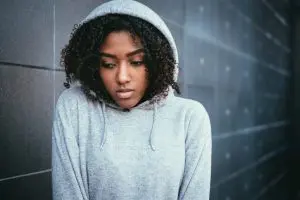What can I do if I’m being sexually abused?
You deserve protection.
RAINN.ORG is one organization that offers online chat and a hotline you can call if you’re not sure what to do or where to go for help.
Am I being abused?
Sometimes it can be confusing or you may be unsure if something is inappropriate. You have a right to know what sexual abuse is so you can get help from adults who are responsible for your safety.
Sexual abuse doesn’t always involve touching.
- it may involve an adult or older peer showing you their private parts
- an adult or older peer that wants you to show your private parts
- voyeurism is when a person secretly watches or records a person
- pornography is photos or video of people who are naked and touching each other’s bodies or engaging in sex, which is contact with another person’s genitals with their own genitals, their mouth, or their anus
- taking photos of you or making you take photos without some or all of your clothing on (any photos of children under the age of 18 is considered a crime – if someone asks for you to take photos or have your photo taken, it is not ok)
- this may be done in person or over the internet or a device – like a phone or tablet through texting, social media apps, or online games
Sexual abuse that involves touching would include:
- a person that makes you watch them masturbate, which is when they touch their own penis or vulva/vagina
- a person may want you to masturbate and touch your own penis or vulva/vagina
- a person who wants you to touch their private parts (breasts, genitals – penis/vulva/vagina or the buttocks or anus) with any part of your body or wants to touch your private parts. This can be over the clothing or under the clothing or with no clothing on. Sometimes people act like this is an ‘accident’.
- sodomy is when a person puts an object into a person’s anus or their own anus – they may do this with a part of the body or an object
Sexual Trafficking
People who pay or offer drugs to you or someone else to engage in sexual activity with you – this is called sex trafficking and it happens to teens all across the country, organizations like Polaris have online chat and a hotline if you need to talk to someone.
Traffickers are people who force children or teens into having sex for payment. These people often act as a friend or boyfriend, and then pressure, drug, or physically force you into sexual activity.
Sexual Harassment
Sexual harassment is abusive and can lead to physical abuse
- comments that are sexual in nature made by adults towards children or teens is not appropriate
- comments that demean, threaten, or insult a person based in sexual behavior or orientation
Under Title IX all students in public schools have federal protection from sexual discrimination, harassment and assault. School staff are required by law to handle disclosures of discrimination, harassment, and abuse in a timely and accurate manner.
Grooming Often Happens Before the Abuse
Adults and peers that sexually abuse children and teens may try to gain your trust and make you feel emotionally connected to them, and comfortable with affectionate touching before they abuse. Signs of grooming to be aware of:
- An adult that begins communicating with you privately via text, social media or talks about very private issues with you when they are alone with you. They may discuss their romantic or sexual life or ask you questions about your sexual activity.
- If they are married or in a relationship, they may tell you that you are superior to their partner and that they wished they were your age, or talk about how great life would be if the two of you were a couple
- They may become very affectionate and touchy with you, encourage you to sit close with them, on their lap or share a blanket
- They may talk negatively about your parents or caregivers, that they understand what you’re going through in life and that you do not need your parents/caregivers in your life
- They may show you pornography or talk sexually to you (remember – showing pornography to a child is illegal).
- They may encourage you to participate in illegal behaviors like smoking, drinking, or doing drugs – they may do this to make it harder for you to say no and also to threaten to tell and use it as a means to control and abuse you.
It’s NOT your fault.
Everyday children are experiencing sexual abuse, almost always, by someone they know and trust, and they don’t know how to make it stop or if anyone can help them. We work to help end this issue because we know that sexual abuse is never a child’s fault.
Whether it’s happened once or it’s been ongoing since you can remember, it’s not your fault.
Whether you were forced against your will or were manipulated to believe this is something you wanted, it’s not your fault.
If you were tricked into doing things you knew were wrong and now you’re afraid of being told it’s your fault, we’re here to tell you – it’s not your fault.
If it felt good to your body this is completely natural, and not something to be ashamed of. Sexual stimulation – through viewing photos or videos, or touching, is something that we cannot control or choose. Abusers know this and used it against children. It may make you feel confused about whether or not it’s your fault or question your sexual orientation, but it’s not your fault. With help and professional therapy you can work on healing from this manipulation.
Our mission is to protect children and help adults be prepared to believe children and teens, like you, who need help because we know how difficult and complicated telling can be.

You deserve protection.
RAINN.ORG is one organization that offers online chat and a hotline you can call if you’re not sure what to do or where to go for help. We also recommend checking out:

Stop It Now!
Stop It Now! prevents the sexual abuse of children by mobilizing adults, families and communities to take actions that protect children before they are harmed.
We provide support, information and resources to keep children safe and create healthier communities. Since 1992, we have identified, refined and shared effective ways for individuals, families and communities to act to prevent child sexual abuse before children are harmed - and to get help for everyone involved.

Male Survivor
Hope, Healing & Support for men from all walks of life. Every man who has experienced sexual assault or sexual abuse deserves access to a judgment-free space where he can heal on his own terms and without shame. For 26 years, MaleSurvivor has fostered a healing community where tens of thousands of men from more than 200 countries come together to find support, information and — most importantly — hope.

RAINN
RAINN (Rape, Abuse & Incest National Network) is the nation's largest anti-sexual violence organization and operates the National Sexual Assault Hotline (800.656.HOPE, online.rainn.org). RAINN also carries out programs to prevent sexual violence, help survivors, and ensure that perpetrators are brought to justice.
If you’re ready to disclose
There are likely to be a number of questions running through your head:
Will I be believed?
Is there an adult in your life that has ever spoken to you about your right to be treated with respect and that inappropriate behavior is not your fault? If this person is not a parent or other caregiver, maybe it’s a teacher, school nurse, doctor, therapist, or guidance counselor. These people are all mandated reporters which means when a child tells them they’ve been sexually abused, they are required to file a report to help get the authorities involved to investigate and help protect you.
What will happen next?
In many states there are places called a Child Advocacy Center – a place where people who are under the age of 18 can go to to talk to someone in a home-like setting. This person is not a police officer but a caring adult who is trained to listen and believe children who need to disclose sexual abuse. You will likely meet with this person more than once – they want you to feel comfortable and will help you understand the process of making a disclosure and what happens next.
What else can I do?
Writing down your memories, or if you have recently or are still being abused – keeping a journal of dates/times as best you can of what you’ve experienced can be very helpful if you decide and are able to seek help with a police investigation and potential trial.
If you are able to obtain video or audio recording of your abuse or the abuser talking to you about the abuse, you must first prioritize your safety and be sure that you are not putting yourself in further danger to do so.
I did tell, and it didn’t help.
We know that there are many survivors who may have told more than one person and they weren’t believed, and even blamed for what happened. This is why we exist – to educate more adults to be prepared to believe children and know how to help.
Some children will be believed but the adults in their life don’t take the proper steps to protect them. This is not ok. You deserve to be protected. It can be very upsetting and confusing to realize that the adults you trust to help you, won’t do that. Sadly, even adults often have their own weaknesses and failures that cause them to not do the right thing. This does not mean that you are not worthy of love and protection. That’s why our work exists, to help every person know their worth – especially children who are experiencing sexual abuse.
I denied the abuse before, is it too late?
It is very common for children who have experienced abuse to deny that it happened or change their mind and say that they lied. Telling people that you’ve been sexually abused is not easy and people don’t always want to believe that it’s true. Knowing you may have to talk to strangers about the abuse can be scary. If you’re ready to disclose abuse that you’ve previously denied, you’ll want to know that you’re talking to someone who will understand. A school psychologist, a therapist if you’re seeing one, your pediatrician, or a trusted adult who you feel confident and comfortable talking with, are possible options. And again, RAINN.org is always a good resource.
I’m afraid what will happen if I tell.
It’s not uncommon at all for kids not to tell they’re being abused because they’re afraid of what may happen to the person who is sexually abusing them. This person may be the only person who seems to care, or they’re a member of your immediate family and you’re afraid of what may happen to your family. Allowing sexual abuse to continue is something you do not have to tolerate. Adults that commit sexual abuse against children need help and they also need to be away from children so that other children can be protected.
If you’ve been told that allowing this person to sexually abuse you will stop them from touching another child that you’re trying to protect, in all likelihood – they are abusing other children despite what they’ve told you. You do not need to allow any kind of abuse to continue and suffer in silence. Getting support from qualified adults, from organizations like RAINN.org can be an important first step to preparing yourself to disclose abuse.